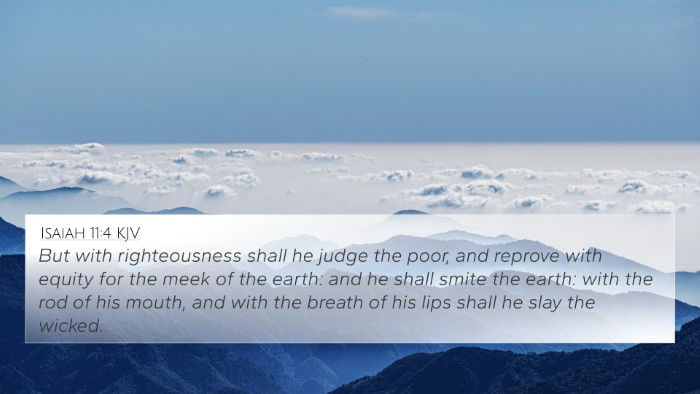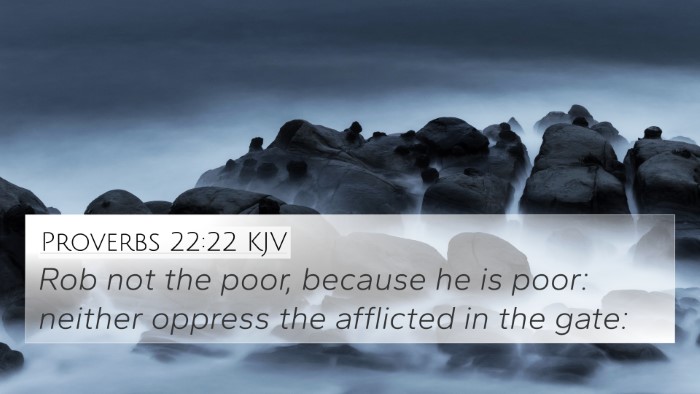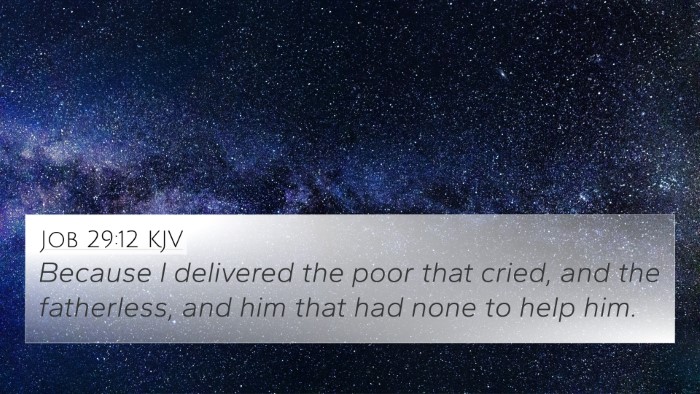Understanding Job 36:6
Job 36:6 states: "He does not preserve the life of the wicked, but gives the right to the afflicted." This verse encapsulates a profound theological principle about divine justice and the treatment of those who suffer.
Summary of Insights from Public Domain Commentaries
The analysis provided by Matthew Henry emphasizes that this verse highlights God's commitment to justice. He interprets it as a reminder that the wicked will not find favor in God's eyes, while the afflicted will be supported. This dichotomy calls attention to God's active role in upholding righteousness and punishing wrongdoing.
Albert Barnes further elaborates that the verse serves as encouragement to the afflicted. He explains that while the wicked may prosper for a time, their end is destruction. Conversely, God is attentive to the circumstances of the righteous and will ultimately deliver them from their hardships.
According to Adam Clarke, the focus of the verse is on the disparity between the fate of the wicked and the blessings of the righteous. He stresses that the text serves not only as a prophesy of judgement but also as a message of hope for those enduring trials, reaffirming God’s protective nature towards those who are oppressed.
Key Themes
- Divine Justice: The verse illustrates the principle that God does not spare the wicked from punishment, highlighting His fairness in dispensing justice.
- Affliction and Righteousness: It underscores the notion that God is especially close to those who suffer, offering hope to the afflicted.
- Hope for the Afflicted: The verse conveys a message of reassurance that God is aware of and responds to the plight of the righteous.
Bible Cross References
Job 36:6 connects to several other scriptures, providing deeper insights through thematic links. Here are some notable cross references:
- Psalm 37:28: "For the LORD loves justice; he will not forsake his saints." This verse reinforces the idea that God protects His people and will not abandon them.
- Proverbs 11:21: "Be assured, an evil person will not go unpunished, but the offspring of the righteous will be delivered." This emphasizes the ultimate justice of God.
- Isaiah 33:15-16: Discusses the characteristics of those who are righteous and how they will be rewarded.
- Matthew 5:11-12: Jesus declares that those persecuted for righteousness' sake will find joy in their reward, paralleling the plight of the afflicted in Job.
- 1 Peter 3:12: Reinforces God's attention to the righteous while also demonstrating that He is against those who do evil.
- Romans 2:6-8: Paul explains that God will repay each person according to what they have done, echoing Job's themes of justice.
- Psalm 9:9: "The LORD is a refuge for the oppressed, a stronghold in times of trouble," aligning with the notion of God defending the afflicted.
Connections Between Bible Verses
This verse stands at the intersection of various Biblical themes, encouraging both personal reflection and scholarly study.
- Linking with Wisdom Literature: Job, Psalms, and Proverbs often resonate with similar themes of justice, affliction, and divine oversight.
- Thematic Bible Verse Connections: Exploring how this verse interacts with others about justice and suffering can enrich one's understanding of the narrative arc of the Bible.
- Comparative Bible Verse Analysis: Cross-referencing Job with New Testament teachings on suffering and righteousness like those found in the letters of Paul or the teachings of Jesus can illuminate the continuity of themes across the Testaments.
Tools for Bible Cross-Referencing
For those interested in delving deeper into cross-referencing Bible texts, several resources are available:
- Bible Concordance: A comprehensive index of Biblical words and phrases that help locate relevant verses.
- Bible Cross-Reference Guide: Useful for finding scriptural parallels and connections.
- Cross-Reference Bible Study: Methods to engage with the text that seek to uncover the intertextual connections within scripture.
- Bible Chain References: A method of linking verses that expands understanding through thematic connections.
This multifaceted approach enriches one's study and understanding of Job 36:6, situating it within the grand narrative of scripture that emphasizes God's justice, the protection of the afflicted, and the inevitable downfall of the wicked.
Conclusion
In conclusion, Job 36:6 serves as a powerful reminder of the duality present in God's character as both a just judge and a compassionate protector. By studying this verse alongside its cross-references, one can gain a broader understanding of Biblical themes relating to justice, suffering, and faithfulness.



















